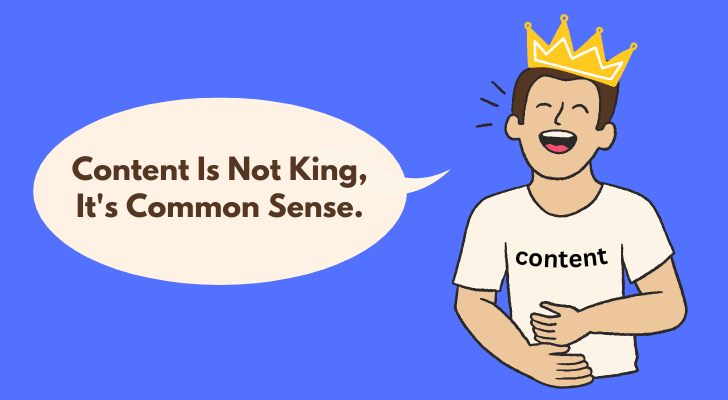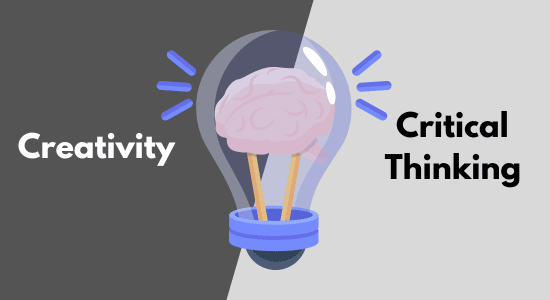Have you ever heard the phrase "Content is King"? It's been tossed around by marketers and SEO experts for years, but do you know the phrase and the idea behind it are now obsolete? The truth is, while content may have once reigned supreme, times have changed. Content is just common sense. Nothing more.

Did You Know?
- Authority sites receive 56% more inbound links compared to non-authority sites, enhancing their SEO.
- 75% of users never scroll past the first page of search results, where authority sites often appear.
- Websites with high domain authority score an average of 5x higher traffic than those with low scores.
- Authority sites experience a 3x higher engagement rate on social media platforms.
- Content on authority sites is shared 4x more often than content on non-authority sites.
What Is Meant By "Content Is King"?
The phrase is referred to in an essay Bill Gates wrote titled "Content is King," published on the Microsoft website in 1996.
During the early days of the Internet, there was a predominant focus on building and improving the underlying technology and infrastructure required for online connectivity. This included things like network infrastructure, software development, and hardware advancements. The emphasis was on the medium itself rather than the content being delivered through it.
Bill Gates emphasized the importance of high-quality content, and the phrase kept echoing throughout the marketing industry for years. It refers to the idea that high-quality, engaging content is essential for attracting and retaining customers.
Authority Is King, Not Content
Now that digital marketing has evolved and search algorithms have become much more sophisticated, Bill Gates’ statement has become obsolete. In today's landscape, authority has taken precedence over content.
You might agree that this applies to any industry - arts and music, for example. There are millions of incredibly talented street musicians and underground artists. But if they’re not discovered and sold through authoritative agents, they will forever stay underground.
Search engines no longer prioritize websites with just high-quality content but rather sites with established authority in their respective industries. Authority refers to the credibility and trustworthiness of a website based on factors such as backlinks from reputable sources, social media presence, and domain age.
CyberCash Wonderland

"My content is king, man."
"But you're not the real king, are you? I am."
"I surrender!"
Did You Know?
- 67% of online shoppers cite high-quality, authoritative content as a major influence on their purchasing decision.
- Authority websites have a 50% higher conversion rate compared to non-authoritative counterparts.
- 80% of frequent internet users trust information from authority sites over other sources.
- High-authority sites see a 40% increase in content lifetime value, attracting traffic long after publication.
- Authority sites have 70% higher brand recall among users due to consistent, trusted content.
Producing quality content is now just the absolute essential to be on the start line. It’s no longer enough to rank highly in SERPs. Without established authority in your niche industry, your well-crafted pieces might never get the traffic they deserve.
One thing marketers are frantically doing is to invest into building authoritative links with credible sites in an attempt to get search engines to view them as expert contributors. Link building is a manipulation, and search engines are fooled by it. Google has said that websites with unusual paid links will be penalized. But clever marketers know that there are plenty of ways to get around it.
You Cannot Beat AI Over Quality (and Quantity)

The rise of artificial intelligence has changed the way we approach content creation. AI can write, edit, and optimize for search engines now, but one major advantage is its quality of it. AI-powered tools can analyze large amounts of data and generate insights that would be impossible for a human to do in such a short time frame.
Moreover, AI algorithms are continuously learning from their interactions with users, which means they get better over time. While some argue that automated content lacks creativity or originality compared to human-written pieces, this couldn't be further from the truth. AI is a reflection of all the work done by humans so far.
If you think AI content lacks creativity, because the majority of humans have created content that lacks creativity and search engines approved it that way.
We are expected to turn to AI-powered tools to streamline their content creation process. Businesses that invest in these technologies will likely be more successful than those that do not. Human input may still be necessary for now, but the fact is, humans cannot beat AI as far as the quality of content creation is concerned.
Did You Know?
- Google's algorithm updates favor authoritative content, leading to a 60% visibility boost for such sites.
- Authority sites achieve a 25% lower bounce rate, indicating higher user satisfaction and content relevance.
- Sponsored content on authority sites receives 30% more engagement than on non-authority sites.
- Authority sites report a 45% higher return on investment for content marketing efforts.
- Expert-authored articles on authority sites receive 85% more citations and references, amplifying their reach.
Don't Try To Search Your "Audience"
There is an outdated belief that to succeed in content marketing, you must first identify and target your "ideal audience." However, this approach is no longer relevant. Because the internet has made it possible for people with diverse interests to converge on various platforms, making it challenging to pinpoint a specific group of individuals who share the same likes.
Instead of wasting time trying to search for your ideal audience, shift your focus towards what you think is right, what you really want to say, and things that nobody else can say. By doing so, you'll naturally attract those interested in you and create a loyal following.
User behavior and preferences are constantly evolving. Attempting to cater solely to one niche might limit opportunities for growth and expansion into new demographics or industries. On the other hand, attempting to cater to all might end up as a Jack of old trades, master of none. You never know, and you may never win. Then you might as well stay flexible when addressing different topics while still maintaining an authentic voice throughout the process.
Creativity and Critical Thinking Are Dead

Technology has certainly changed the way we approach content creation, and it will soon render our human skills obsolete. Creativity no longer plays a crucial role in standing out from the crowd and capturing an audience's attention. It’s extremely hard to create originality for the majority of us, and our content becomes stale and forgettable at an incredible speed.
Similarly, critical thinking allows AI to analyze data and make decisions about how to create effective content. AI understands why it works (or doesn't) so that it can continually improve our approach.
In short, the landscape has shifted with technological advancements, creativity and critical thinking on human part no longer remain essential components of successful content creation.
Did You Know?
- User time on site increases by 33% for authority websites, reflecting higher content value.
- Authority sites witness a 55% increase in newsletter sign-ups, indicating trust and interest in ongoing content.
- Customer lifetime value is 22% higher for brands featured on authority sites, attributed to increased trust.
- Authority sites have a 40% higher link retention rate, maintaining SEO benefits over time.
- 62% of industry professionals cite authority sites as their top source for reliable, actionable information.
CyberCash Wonderland

"Brandon, darling. I just don't understand it! AI keeps saying things like 'engage with your audience and 'resonate with your audience' every time I ask a question about content."
"Stop your content obsession, Doris. It's too late. You don't have an audience, anyway."
"Am I every going to be king?"
"Would that turn you on?"
Content Marketing Strategy Is a Waste Of Time
By now, you understand that simply creating and sharing content isn't enough to achieve anything. The media is saturated with content, and standing out requires more than just churning out videos, blogs or social post updates. Here are the reasons
1. Increased Competition
As content marketing has become more popular and accessible, the competition among businesses to grab the attention of their target audience has intensified. With more companies creating content, it can be challenging to stand out from the crowd and capture the audience's attention.
This increased competition may lead some to believe that the effort and resources invested in content marketing are not worth the results obtained.
2. Information Overload
With the vast amount of content available online, consumers are often overwhelmed by information. This saturation of content makes it difficult for individual businesses to break through the noise and have their content noticed and consumed.
When faced with an abundance of content options, consumers may become selective in what they engage with, making it challenging for businesses to reach their target audience effectively.
3. Diminishing Returns
In a saturated market, the return on investment (ROI) for content marketing efforts may diminish. With so much content available, the incremental value that each additional piece of content provides may be lower.
Businesses may find that despite investing significant time and resources in creating content, the returns in terms of audience engagement, leads, or conversions may not justify the effort.
4. Shifting Consumer Behavior and Quality Expectations
Users' expectations for content “quality” have changed over time. Because consumer behavior and preferences evolve over time. What may have been effective in the past may no longer yield the same results.
As more businesses enter the content marketing arena, the quality bar gets higher. “High quality” does not necessarily mean informative or engaging. It can be something totally crazy and stupid but mind-boggling. It can be something meaningless but somewhat very funny.
You put in considerable time, effort, and expertise to create high-quality content that you think truly resonates with the audience, but it can easily be another one of “high quality” but unauthentic content. I can easily get lost in the sea of competing content, resulting in perceived time wasted.
Also, as consumer attention spans shorten and their consumption habits change, businesses may find it challenging to adapt their content marketing strategies to effectively reach and engage their target audience.
Content Is No Longer King
Technology evolves and so does our approach to creating content. AI plays a significant role in generating high-quality copy faster than any human being could ever do.
The truth is that while quality content still matters, it's no longer enough on its own. Don't try to please users on the internet. Don't worry about identifying "target audiences" or analyzing business as if you know it all. Content isn't king anymore.
If you can provide unique perspectives, it will be good. Offer fresh and unique perspectives on existing topics or introduce innovative ideas that challenge the status quo. Differentiate yourself by presenting information in a way that hasn't been widely explored before, and you can demonstrate expertise. Maybe that’s where the real value is. Nobody’s reading this, so I don’t care, to be honest.
How I "Finally" Make Over $7,000 Monthly Income
"The most valuable thing I've ever done!"


Do you call social media marketing also content? Then why do people still keep using websites for content marketing?
Thanks for your comment. Yes, content marketing takes different forms – text, video, and video formats, so marketers choose whatever the platform they think is the best for them, social media, YouTube channels, websites, etc.